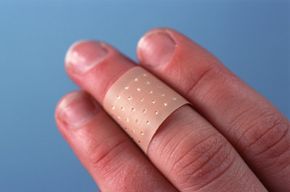When a hobby-store owner in Cincinnati sliced off his fingertip in 2005 while showing a customer why the motor on his model plane was dangerous, he went to the emergency room without the missing tip. He couldn't find it anywhere. The doctor bandaged the wound and recommended a skin graft to cover the top of his right-middle stub for cosmetic purposes, since nothing could be done to rebuild the finger.
Months later, he had regrown it, tissue, nerves, skin, fingernail and all.
Advertisement
This particular hobbyist happened to have a brother in the tissue-regeneration business, who told him to forego the skin graft and instead apply a powdered extract taken from pig's bladder to the raw finger tip. The extract, called extracellular matrix, lays the framework that cells use to generate any given body part. It's like a cellular scaffolding, and all animals have it. It holds the signals that direct cells to divide, differentiate and build themselves into a specific form.
Extracellular matrix is a component of body tissue that functions outside of the body's cells (thus the "extracellular" designation). It's made up mostly of collagen, a type of protein. So extracellular matrix extracted from the bladder of a pig does not actually have any of the pig's cells in it.
In human fetuses, the substance works in concert with stem cells to grow and regrow everything from heart aortas to toes. Fetuses can regrow almost anything that gets damaged while in the womb. Scientists have long believed that when a fetus reaches full development, this extracellular matrix stops functioning. But with evidence that applying extracellular matrix from a pig can initiate certain types of regeneration in humans, they're wondering if they can trigger human extracellular matrix to start working again. After all, according to regeneration researcher Dr. Stephen Badylak of the University of Pittsburgh, children up to the age of two have been known to regrow fingertips with no outside help.
Pig-extracted extracellular matrix is already used by veterinarians to help horses repair torn ligaments. In people, it's used to treat ulcers, closing a hole in the tissue that lines the stomach. It employs an entirely different process than the typical mammalian healing mechanism. Let's take the case of a person who loses the tip of a finger. When the finger is severed, the cells die, and their contents seep into the surrounding tissue. This alerts the immune system to a problem. The immune system's response to cell death is inflammation and scar tissue. The formation of scar tissue prevents any future cellular development in the area. That's why scars last -- cells are prevented from doing a repair job on that skin.
But when extracellular matrix is applied to a wound, it doesn't trigger an immune response. Instead, when it begins to break down into surrounding tissue, it causes the cells in that tissue to start repairing the damage the way they would in a developing fetus (or a salamander that loses a limb) -- they divide and rebuild, creating new, normal tissue, not scar tissue.
Combined with developments in stem-cell research, this extracellular matrix may work miracles in the area of regeneration science. As of early 2007, testing of the effects of extracellular matrix is being carried out on a military base in Texas. Scientists are using the powdered pig extract on Iraq War veterans whose hands were damaged in the war. They're opening the wounds and applying the component to finger stubs in an attempt to regrow them. The researchers conducting the study say they don't expect to regrow the entire finger, but are hoping to regrow enough of a finger to allow for some utility. They don't believe it will regenerate bone, but nothing is for sure right now. That man in Cincinnati had only lost his finger tip, at the lower part of the nail; he hadn't lost the entire finger.
Help from pigs aside, many wonder if the extracellular matrix in humans is unable to function or is simply in a latent state, awaiting some sort of trigger. Do humans in fact have the same regenerative capacity as salamanders, which can regrow an entire limb, and researchers just haven't found a way to activate the mechanism? It's not just amphibians that can regrow body parts: Deer regularly regrow lost antlers, composed of bone, tissue, cartilage and skin -- the same things that make up human limbs. Could there possibly be an internal switch that would reactivate the regeneration capacity that humans possess in the womb? Regenerative medicine is actively pursuing answers to these questions. And in the meantime, if applying powdered pig extract to a snipped finger can in fact facilitate regrowth, the possibilities for medicine are startling. Spinal injuries, amputated limbs and damaged organs could all be coaxed back into a complete, healthy state if science finds the right combination of treatments.
For more information on regeneration science and related topics, check out the links on the next page.
Advertisement
